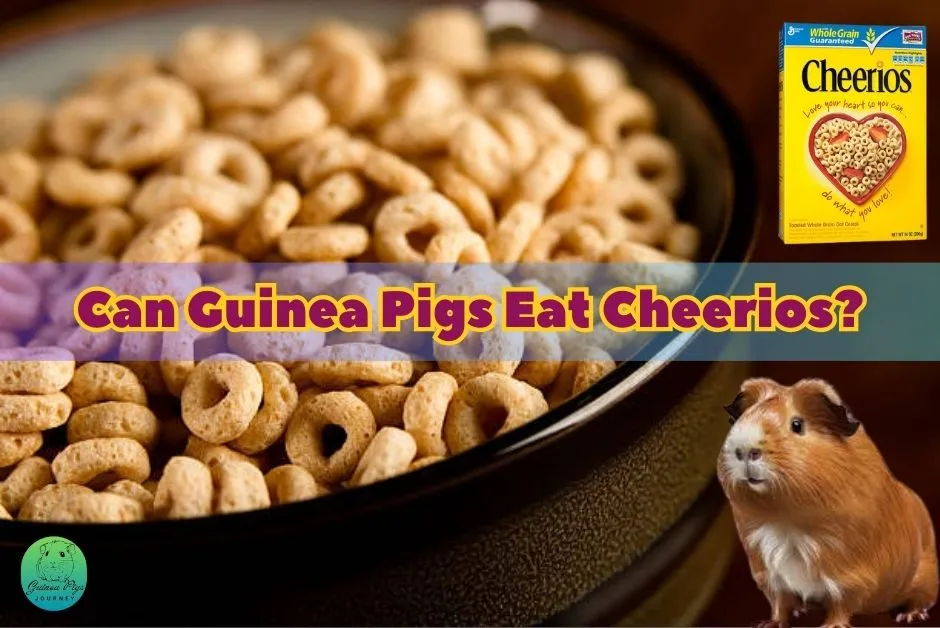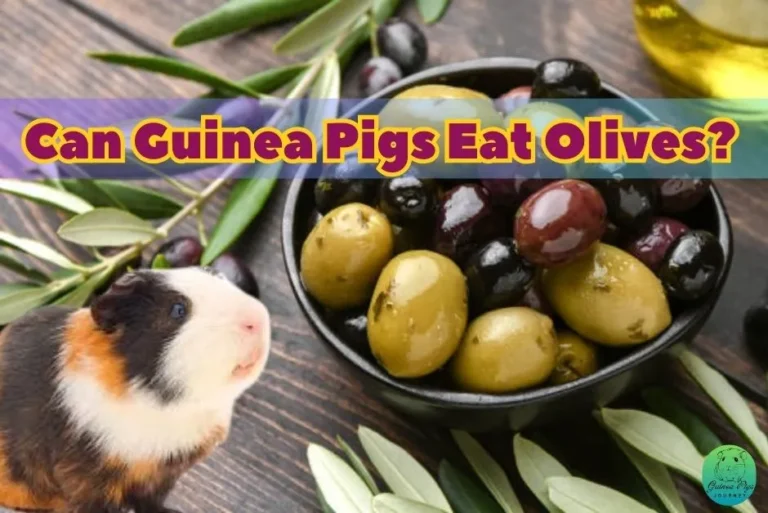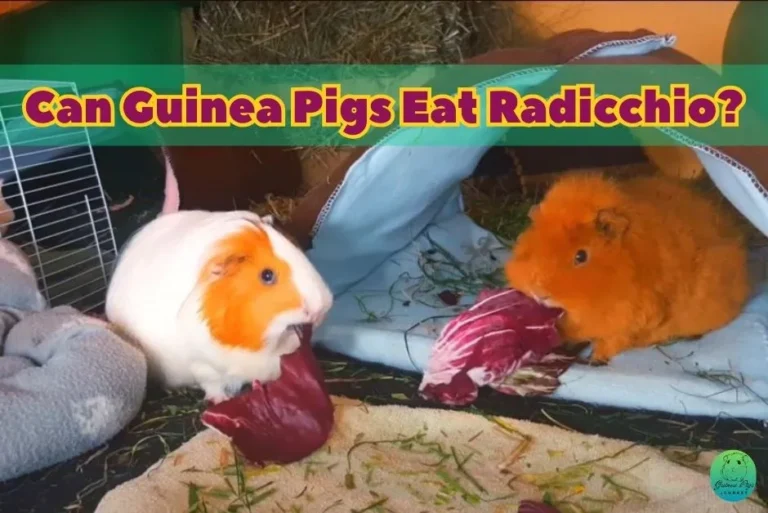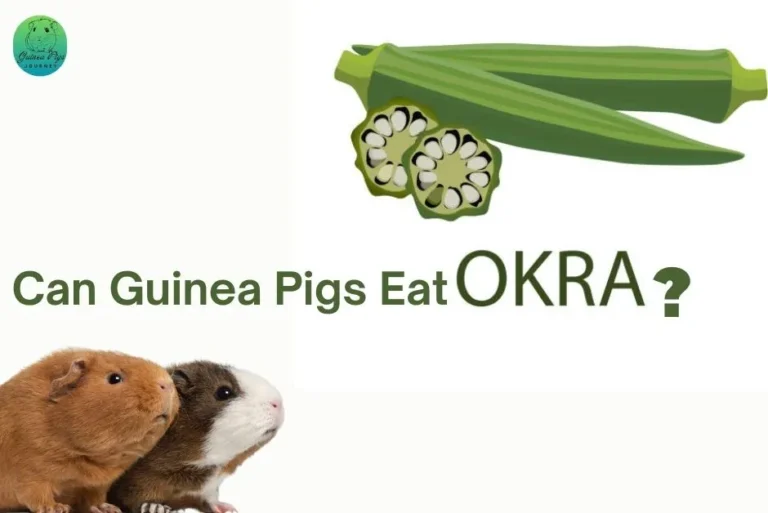Cheerios contain whole grains and nutrients like vitamin D and iron. But Cheerios are processed food and eating processed foods often may have negative consequences on your health while remaining one of the most popular breakfast cereals and has been a staple in households across the United States. Although they’re marketed as nutritious for humans, you may also wonder whether Cheerios for guinea pigs is a healthy choice, bearing the question in mind: can guinea pigs eat Cheerios? How do the different varieties of Cheerios compare for guinea pigs?
The quick answer is! NO, Guinea pigs should not be fed Cheerios at all as they are primarily made from whole grains, and highly processed rules them out from the guinea pigs’ safe food list. According to a new study by the Environmental Working Group (EWG), Cheerios and Quaker Oats might contain chlormequat, a pesticide linked to reduced fertility, harm to the reproductive system, and altered fetal growth in animals.
Although Cheerios are packed with a wide array of important nutrients, including iron, fiber, and vitamin D. However, keep in mind that many of these nutrients, including iron, vitamin B12, and vitamin D, are added during processing and not naturally occurring which means contain no nutritional values other than processed harms for guinea pigs.
This long guinea pig journey has taught me to do proper research on the list of safe and unsafe foods for guinea pigs that need great care and understanding because not all foods your guinea pigs eat are safe like jalapenos, pickles, grains, meat, etc. and some are toxic and harmful to their health as well. So, you must also know about those foods not recommended to feed guinea pigs for a safe and healthy life of your guinea pigs.
Are Cheerios Good For Guinea Pigs?
Although, cheerios for guinea pigs are not poisonous or toxic, but they are an extremely unhealthy treat for your guinea pigs including plain cheerios, honey nut cheerios, multi-grain cheerios, or any other flavor. Long-term incorporation of Cheerios cereal in guinea pigs’ diets can result in many serious health conditions leading to many health problems.
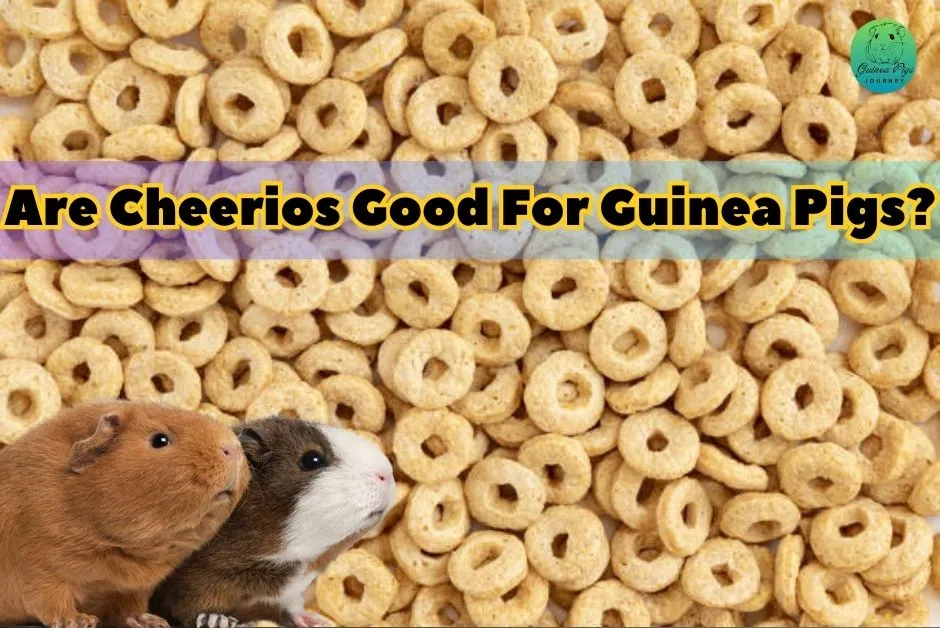
Cheerios for guinea pigs are made from whole grains and processed with preservatives, sugar, starch, oil, etc. making it an extremely unhealthy option for your guinea pigs because your guinea pigs’ digestive system is not that much capable of dealing with grains, oil, and starch. Cheerios are high in calcium, which is another reason to avoid cheerios for guinea pigs. Cheerios for guinea pigs also include high calories not good for their overall health.
The EWG said it found detectable levels of the chemical in 92% of nonorganic oat-based foods purchased in May 2023. The EWG Studies in laboratory animals show that chlormequat can cause harm to the normal growth and development of the fetus and damage the reproductive system.
Important to note that, do not panic if your guinea pig eats a few or a small amount of Cheerios as these are not toxic and very unlikely to cause any harm to your guinea pig. However, as already mentioned earlier, long-term feeding of Cheerios to your guinea pigs may pose serious health-related issues including digestive health, renal health, heart health, GUT health, etc. So it is not recommended to feed Cheerios and other cereals to your furry friends. It is always recommended to opt for the best and recommended diet for your guinea pigs’ overall health and more suited to your guinea pigs’ digestive system and nutritional requirements.
Nutritional Requirements of Guinea Pigs:
Guinea pigs have a very delicate and sensitive digestive system which makes a responsible owner understand the sensitivity of selecting any new food for their furry friend. So, ensuring the recommended and best diet for guinea pigs is very important by applying the best ways to feed guinea pigs.
In general, Guinea pigs require good quality hay which makes up 80-90 % of most of their diet along with 10 % of fresh and good quality vegetables, leafy greens, and fruits like Sugar snap peas, broccoli, mustard greens, arugula, plums, cherries, nectarines, pears, honeydew melon, dragon fruit, blackberries, plums, pomegranate, jicama, butternut squash etc. as an occasional treat in moderation.
Guinea pigs can also be served with some amount of only dedicated guinea pig pallets but it should not be part of their main staple and should be served the recommended portion or mentioned on pallets bag for guinea pigs. Guinea pigs should also be served with fresh, clean, chlorine-free drinking water at all times and must be checked and changed twice a day for their good health.
Guinea pigs, from a nutritional viewpoint, require 30-50 mg of Vitamin C daily in their diet very crucially for wound healing, collagen biosynthesis, and bone growth. It is paramount to always understand the nutritional requirements of a pet like a guinea pig having a unique digestive system to prevent common issues and support their overall health. For this reason, deciding to introduce any new food is equally important to understand the nutritional values of that food.
Nutritional Analysis of Cheerios for Guinea Pigs:
According to the USDA Food Database, the nutritional values and percentages per 100 grams of Cheerios for guinea pigs are listed below. Let’s first analyze the nutritional values to understand whether Cheerios for guinea pigs are safe and good from a nutritional standpoint.
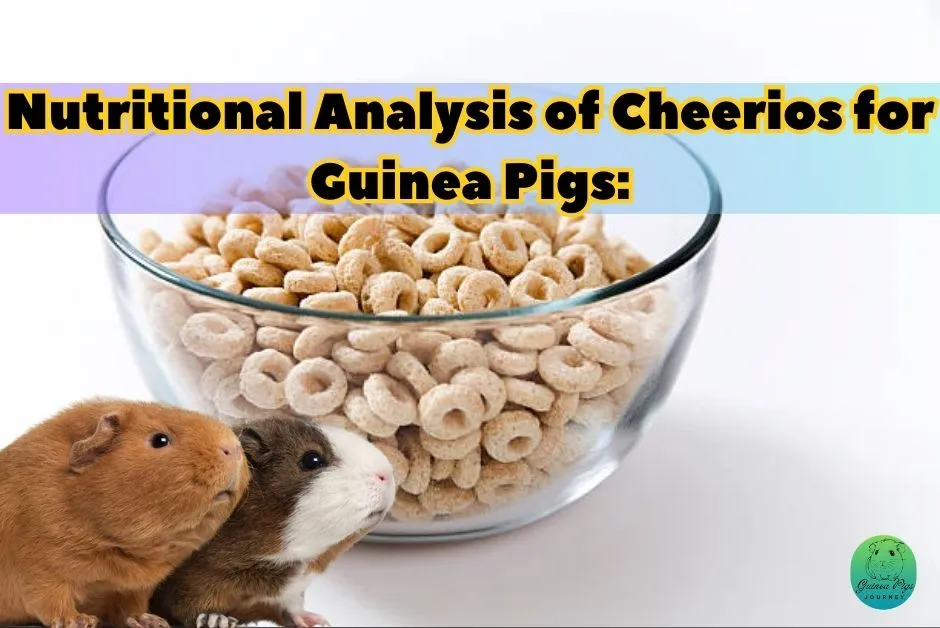
| Nutrients | Value per 100 grams |
| Energy / Calories | 372 kcal |
| Carbohydrates | 73.2 grams |
| Water | 3.76 grams |
| Fat | 6.6 grams |
| Protein | 12.4 grams |
| Dietary Fiber | 10.1 gram |
| Sugar | 4.5 grams |
| Net Crabs | 63.1 grams |
| Vitamin C, total ascorbic acid | 21.4 mg |
| Vitamin K | 2 µg |
| Vitamin A, RAE | 990 µg |
| Vitamin B-6 | 1.79 mg |
| Vitamin D | 3.6 mg |
| Cholesterol | 0 mg |
| Fatty Acid (Saturated) | 1.6 grams |
| Calcium, Ca | 357 mg |
| Phosphorus, P | 357 mg |
| Potassium, K | 633 mg |
| Iron, Fe | 28.9 mg |
| Magnesium, Mg | 114 mg |
| Zinc, Zn | 13.4 mg |
| Sodium, Na | 497 mg |
| Folate | 1198 µg |
** Note: many of these nutrients, including Iron, Potassium, Folate, vitamin B6, vitamin C, vitamin D, etc. are added during processing and not naturally occurring.
After analyzing the nutritional values per 10 grams of Cheerios for guinea pigs, as you can see the chart above contains high calories, fats, carbohydrates, and calcium which are not safe for guinea pigs’ overall health as their digestive system is so sensitive to they cannot go well with a diet high in carbohydrates, sugar, fat, calcium, and calories. So, always stick to those fresh and raw leafy greens, vegetables, and fruits to make a good source of nutritional standpoint for guinea pigs.
What Are the Risks of Cheerios for Guinea Pigs?
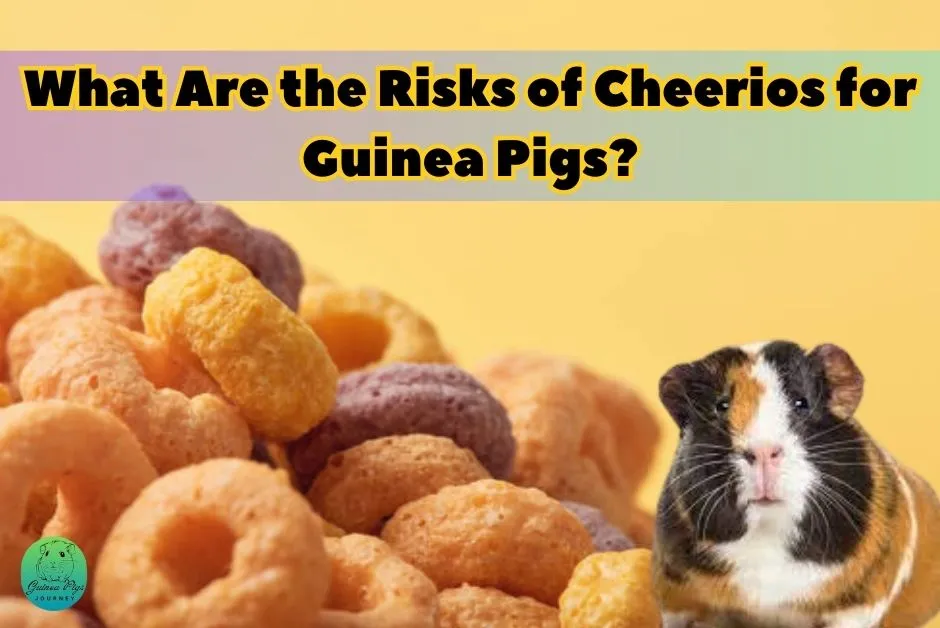
Formation of Bladder or Kidney Stones:
Cheerios for guinea pigs are high in calcium and contain almost 357 mg of 100-gram serving of Cheerios which is too much amount for guinea pigs contributing to the formation of bladder stones due to calcium oxalate leading to very painful conditions, renal failure, urinary tract issues, and surgical procedures to remove the stones. So, avoid feeding the Cheerios to your guinea pigs if you give them as an occasional treat.
Obesity and Weight Gain:
These Cheerios for guinea pigs are highly processed with preservatives, sugar, carbohydrates, and fats making them an unhealthy option contributing to weight gain and obesity in guinea pigs subsequently leading to heart disease, diabetes, increase in blood sugar, and irritation with physique, and many other health-related problems.
Fertility and Growth Issues:
According to the Environmental Working Group (EWG), Studies have suggested that around 80 % of Americans have found the plant pesticide chlormequat which is responsible for fertility and growth issues in animals due to the consumption of foods like Cheerios and Quaker Oats contain higher levels of chlormequat for guinea pigs as well.
Bloating:
Due to the high amount of sodium content in Cheerios, guinea pigs can also feel bloating, thirst, or water retention if too much sodium or salt is consumed which can make them ill and cause health issues.
Stomach Issues:
Cheerios for guinea pigs are high in fiber, although good for the digestive system of guinea pigs but excessive amounts can be very fatal causing stomach issues such as loose stool, flatulence, gastric issues, bloating, diarrhea, etc. So it is best to avoid Cheerios for guinea pigs and go for the healthy options.
Digestive Upset:
Guinea pigs have a very delicate digestive system and require very care about feeding. Cheerios for guinea pigs are high in preservatives and added sugar which can cause serious digestive issues like diarrhea, gastrointestinal upset, vomiting, and bloating. Causing digestive issues means making them ill and leading to more serious health problems. So, avoid Cheerios for guinea pigs.
Nutritional deficiencies:
Cheerios for guinea pigs are not a suitable option as many nutrients, including Iron, Potassium, Folate, vitamin B6, vitamin C, vitamin D, etc. are added during processing and not naturally occurring which makes them unhealthy and unsuitable options for guinea pigs these can result in weakened immune and overall health of guinea pigs.
Choking Hazards:
Cheerios for guinea pigs are small and can also pose choking hazards. If guinea pigs ingest Cheerios in large quantities that may also lead to digestive blockage subsequent bloating or respiratory issues.
Causes Enterotoxaemia:
Most cereals, breads, and crackers contribute to the growth of dangerous elements which can result in enterotoxaemia within the intestines of pets and animals which can lead to diarrhea, anorexia, and lethargy causing many other health complications.
Can Guinea Pigs Eat Cheerios Cereal?
No, it is not recommended to feed Cheerios cereals to your guinea pigs as it is high in fats, calories, carbohydrates, and sugar which can cause many health-related issues for your guinea pigs. They can also contribute to fertility issues and growth for guinea pigs.
Can Guinea Pigs Eat Plain Cheerios?
Although plain types of Cheerios for guinea pigs are low in sugar and added ingredients, but still, they are not healthy options for your furry friends. So, plain Cheerios for guinea pigs are not recommended to feed which can cause serious digestive issues and health problems for guinea pigs.
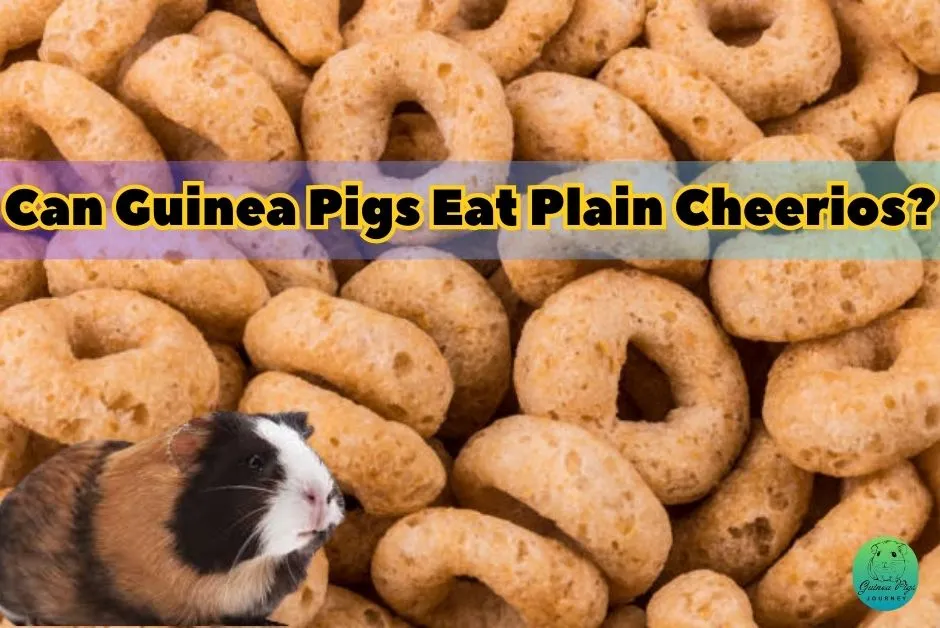
Can Guinea Pigs Eat Honey Nut Cheerios?
Not at all, honey nut cheerios for guinea pigs are even more dangerous containing added honey, nuts, and sugar which can be very harmful to guinea pigs’ overall health causing digestive issues, and other health-related problems like obesity, weight gain, and diabetes. Honey is also not recommended to feed your guinea pigs as they cannot digest the sugar easily and honey is too much sweet for them.
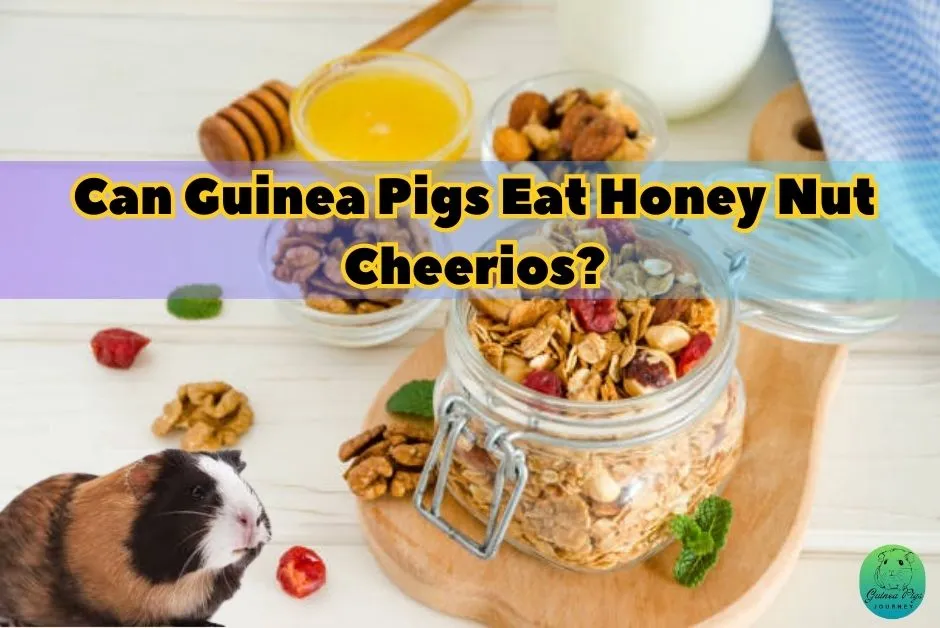
Honey nut cheerios for guinea pigs are highly processed food with added preservatives, syrups, sugar, oil, and other ingredients that can upset their stomach and digestive health causing diarrhea, bloating, vomiting, obesity, and weight gain leading to serious health problems like diabetes, heart issues, blood pressure, etc.
Can Guinea Pigs Eat Multigrain Cheerios?
Multigrain Cheerios for guinea pigs contain different types of whole grains with added preservatives, ingredients, sugar, vitamins, and minerals after processing, making them too much caloric and fattening for guinea pigs. So, multigrain Cheerios for guinea pigs are not recommended to feed which can cause serious health issues being too high in calories, fats, sugar, and carbohydrates while processing, and no natural nutritional values for your guinea pigs as raw vegetables and fruits contain.
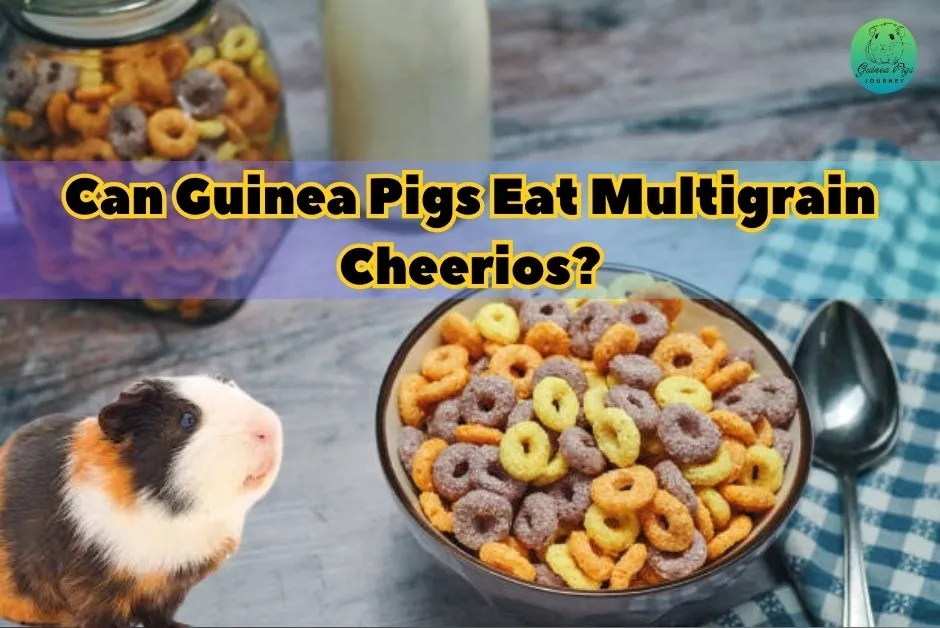
What Type Of Cereals Can Guinea Pigs Eat?
No, it is not recommended to feed any type of cereal such as oats cereals, Chex cereal, shredded wheat cereal, corn flakes, Rice Krispies, Weetabix, frosted cereals or flakes, or Bran Flakes which are made up of whole grains and processed with sugar, ingredients, oil, etc. These types of cereals are bad choices for your guinea pigs and not suitable for their digestive health. So, stick to fresh and raw vegetables and fruits for the best health tips.
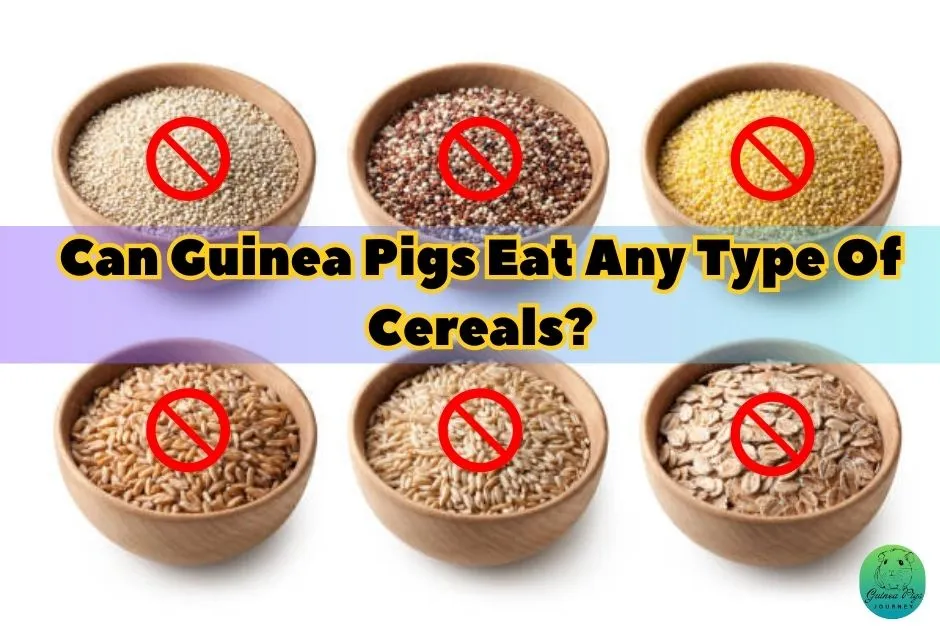
Can Baby Guinea Pigs Eat Cheerios?
No, not at all, if it is advised to avoid Cheerios from your adult guinea pigs, then, in any case, Cheerios are not safe for your baby guinea pigs’ sensitive digestive health which can make them ill and go through many health complications.
Alternatives of Cheerios for Guinea Pigs:
There are many other healthy alternatives that you can offer your guinea pig as an alternative to Cheerios for guinea pigs. These foods provide nutrient-rich elements that can boost the health in many ways of your Guinea pigs. Here are some good alternatives or veggies in raw to consider when preparing a salad in moderation for your cavies;
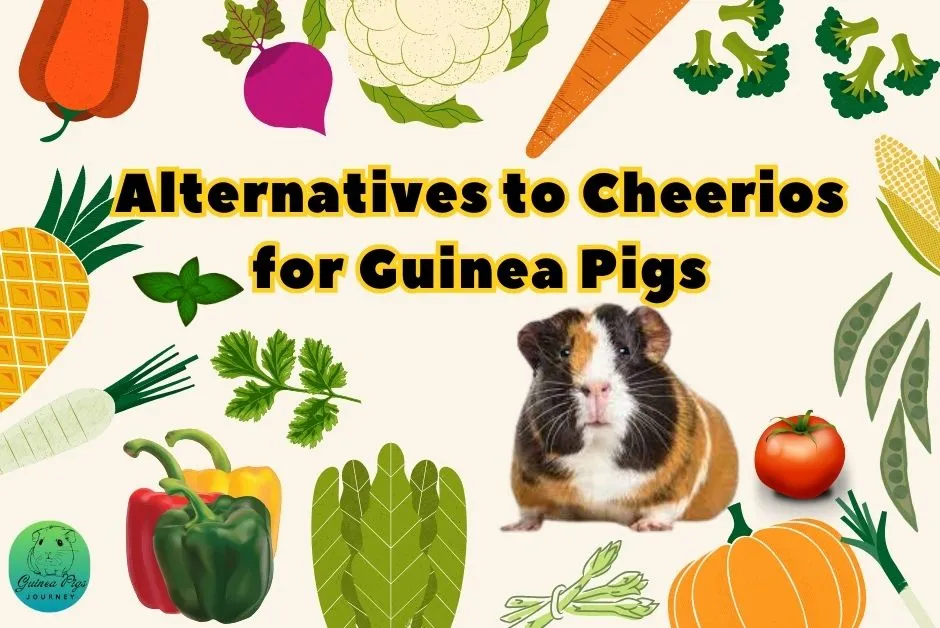
Safe Leafy Greens or Vegetables:
| Vegetables | Remarks | Vegetables | Remarks |
| Romaine lettuce | Leafy Greens (To be fed in moderation) | Zucchini or Courgette (and flowers) | Once or twice a weak |
| Broccoli | (too much can cause gas) – high in vitamin C | Green beans | To be fed in moderation |
| Bell Peppers | High in vitamin C | Lettuce – Butterhead, Red leaf, Cos, Little Gem | Leafy Greens (Not iceberg lettuce) |
| Beetroot | To be fed in moderation | Parsnips | To be fed in moderation |
| Mustard Greens | High in vitamin C | Pumpkin | |
| Carrot tops | Yellow Veggie (Once or twice a week) | Snap Peas | To be fed in moderation |
| Cauliflower leaves and stalks | To be fed in moderation | Arugula or Rocket salad | Leafy Greens (To be fed in moderation) |
| Celery leaves | To be fed in moderation | Wheatgrass | To be fed in moderation |
| Cilantro and Parsley | Leafy Greens (To be fed in moderation) | Dandelions greens | High in vitamin C |
| Chicory | To be fed in moderation | Swiss chard | To be fed in moderation |
| Collard greens | To be fed in moderation | Tomato (not leaves/vine, as poisonous) | High in vitamin C – Once or twice a weak |
| Radicchio | To be fed in moderation | Only safe varieties | Only safe varietes |
| Asparagus | High in vitamin C | Parsley | Leafy Greens (high in vitamin C) |
Safe Herbs:
- Basil
- Coriander or Cilantro
- Dill
- Mint
- Oregano
- Rosemary
- Sage
- Thyme
Fresh Fruits:
Guinea pigs’ nutritional requirements can also be achieved through some safe fruits which can be served as a treat in their diet once a day or several times a week. Some fruits rich in healthy nutrients include Plums, honeydew melon, pomegranate, pears, blackberries, nectarines, cherries, and some citrus fruits like orange or grapefruit that can boost the requirement of vitamin C for guinea pigs if fed in moderation. It is recommended to keep the portion and size of serving small since fruits are rich in sugar content that can be harmful if fed excessively to guinea pigs and cause several health risks for guinea pigs.
Conclusion: Cheerios for Guinea Pigs
Overall, Cheerios are not safe food for your guinea pigs which can cause serious digestive and health issues because these are processed foods with added sugar and preservatives. Although cheerios are not toxic, long-term feeding cheerios to your guinea pigs can be dangerous causing stomach upset, bladder or kidney stones, enterotoxaemia, and other health issues.
Cheerios can also affect the fertility and growth issues in animals according to the environmental working group, so the same goes for the guinea pigs. So, stick to fresh, raw, and organically produced hay, vegetables, leafy greens, and fruits in moderation. I always recommend consulting with your vet for the best guidance and how to introduce any new food for the safety of your guinea pigs.

